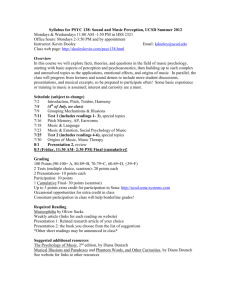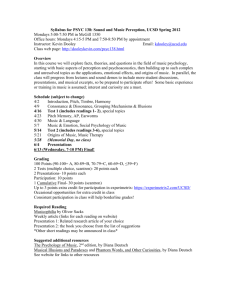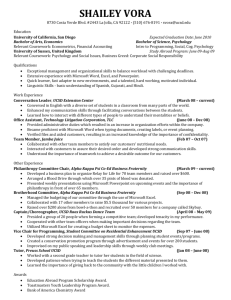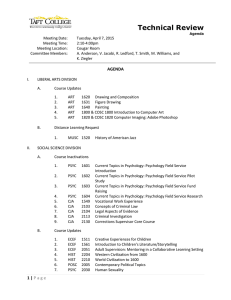Psychology 138: Sound and Music Perception Syllabus
advertisement
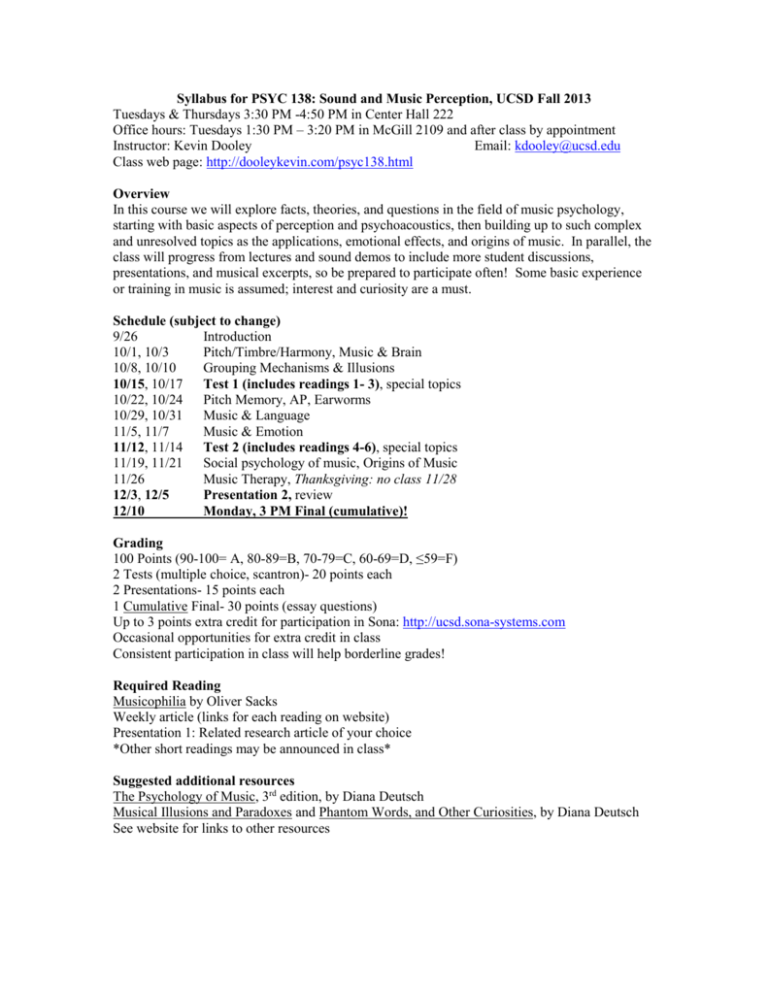
Syllabus for PSYC 138: Sound and Music Perception, UCSD Fall 2013 Tuesdays & Thursdays 3:30 PM -4:50 PM in Center Hall 222 Office hours: Tuesdays 1:30 PM – 3:20 PM in McGill 2109 and after class by appointment Instructor: Kevin Dooley Email: kdooley@ucsd.edu Class web page: http://dooleykevin.com/psyc138.html Overview In this course we will explore facts, theories, and questions in the field of music psychology, starting with basic aspects of perception and psychoacoustics, then building up to such complex and unresolved topics as the applications, emotional effects, and origins of music. In parallel, the class will progress from lectures and sound demos to include more student discussions, presentations, and musical excerpts, so be prepared to participate often! Some basic experience or training in music is assumed; interest and curiosity are a must. Schedule (subject to change) 9/26 Introduction 10/1, 10/3 Pitch/Timbre/Harmony, Music & Brain 10/8, 10/10 Grouping Mechanisms & Illusions 10/15, 10/17 Test 1 (includes readings 1- 3), special topics 10/22, 10/24 Pitch Memory, AP, Earworms 10/29, 10/31 Music & Language 11/5, 11/7 Music & Emotion 11/12, 11/14 Test 2 (includes readings 4-6), special topics 11/19, 11/21 Social psychology of music, Origins of Music 11/26 Music Therapy, Thanksgiving: no class 11/28 12/3, 12/5 Presentation 2, review 12/10 Monday, 3 PM Final (cumulative)! Grading 100 Points (90-100= A, 80-89=B, 70-79=C, 60-69=D, ≤59=F) 2 Tests (multiple choice, scantron)- 20 points each 2 Presentations- 15 points each 1 Cumulative Final- 30 points (essay questions) Up to 3 points extra credit for participation in Sona: http://ucsd.sona-systems.com Occasional opportunities for extra credit in class Consistent participation in class will help borderline grades! Required Reading Musicophilia by Oliver Sacks Weekly article (links for each reading on website) Presentation 1: Related research article of your choice *Other short readings may be announced in class* Suggested additional resources The Psychology of Music, 3rd edition, by Diana Deutsch Musical Illusions and Paradoxes and Phantom Words, and Other Curiosities, by Diana Deutsch See website for links to other resources PSYC 138 Presentation Guidelines Presentation 1: With a partner, choose any research article detailing a study relating to music psychology and discuss the article with the class. In 10 minutes or less, summarize the question, purpose, methods, results, and conclusions of the study. Most importantly, include your response & critique; was the study convincing and well designed? If not, what should be done differently, or if so, what can we learn from the findings and how can we apply them? What follow-up studies would you suggest? Have at least one question to ask the audience. Some typical journal sources include specialty publications like Music Perception and Journal of the Acoustical Society of America, and mainstream publications like Science and Nature. For a more extensive list, see: http://www.uni-graz.at/richard.parncutt/musicpsychology.html Presentation Dates: 10/22, 10/24, 10/29, 10/31, 11/5, 11/7, 11/14, 11/19, 11/21, 11/26 (see sign up sheet to choose your date). Worth 10 points. Presentation 2: Working in groups of 4, conduct an informal study to answer an experimental question of your choice. Choose a topic that you find interesting and that is reasonably manageable to test and collect data for. Typically, anywhere from 10 to 20 subjects will suffice, depending on the nature of your question. Please meet with me to confirm topic and for advice & suggestions! In less than 10 minutes, describe your project to the class: -intro & hypothesis (what’s the question, what do you expect to find & why), -methods (subjects, materials, procedure, independent & dependent variables), -results (may be null but must be real; statistical analyses welcome but not required), -conclusions (critical thinking: why did you get these results and what do they mean?), -future directions (anything you would do differently? ideas for follow-up studies?) Each group will present on 12/3 or 12/5. At the beginning of class that day, turn in only a hard copy of your abstract: a brief summary (about 200 words) of the key information about your study (1 per group). Worth 20 points. General info: How you present is up to you; feel free to use powerpoint, lecture, posters, videos, or interpretive dance. Focus on clarity, content, and audience engagement.
